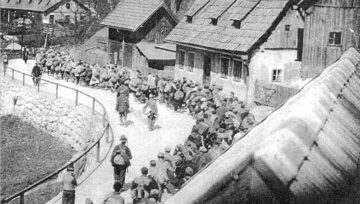by Andrea Scrima

Sometimes it’s a single detail that hits home: a little girl’s pink shoe, for instance, with remnants of the delicate fabric still intact, unearthed among the hundreds of worn-down shoe soles and other objects found in the course of an archaeological excavation on the grounds of the former Liebenau camp in Graz, Austria. The site has since been paved over, covered in large part by housing settlements and a youth center, kindergarten, and sports field. The tour guides’ voices could barely be heard above the basketball game underway on a nearby court; in this vibrant residential neighborhood of Grünanger, the loud cries and laughter of everyday life suddenly seemed jarring and alien.
“Resettlement Camp V” was founded in 1940 for “Volksdeutsche” or ethnic Germans, who were relocated from the Baltic states and other parts of Europe and the Soviet Union, often involuntarily. It consisted of 190 barracks built to accommodate 5,000 inhabitants. A year later, as the war raged on, forced laborers and prisoners of war were brought here to toil under unimaginably harsh conditions in the nearby Steyr-Daimler-Puch works, which manufactured machine parts for the armaments industry. In April of 1945, the camp became a temporary stopover for Hungarian Jews on a two-hundred-mile-long death march to the Mauthausen concentration camp after the “Southeast Wall” they’d been building, Hitler’s defensive strategy of anti-tank trenches and fortifications intended to halt the advance of the Red Army along the Hungarian border, failed and they were “evacuated.” Over a period of several days, six to seven thousand exhausted and severely undernourished slave laborers arrived on foot. They had already been on the road for a week and had been given nearly nothing to eat; in Graz-Liebenau they were forced to sleep outside, on the bare ground. They received a bowl of watery soup and a single slice of bread. Those who were too sick or weak to continue were forced to lie face down in shallow trenches, where they were shot from behind, in the neck.
In May of 1947, the British occupying forces had the mass graves exhumed. A trial, verdicts, and executions followed. After that, the matter was repressed and forgotten. More than sixty years would pass before historians began investigating the site in earnest; some of the older locals still knew where the buildings once stood. A series of excavations undertaken during the construction of a power plant uncovered rubble and building foundations, personal belongings, and human remains bearing evidence of war crimes. Already a politically sensitive issue, the area became a point of contention; it was eventually declared an archaeological site requiring the oversight of specialists during any future construction projects or excavations.
The tour of the Liebenau camp was intended as a prelude to a theater performance, but the weather proved uncooperative: taking our seats on benches arranged around the open-air stage, there came a cloudburst so sudden and dramatic that it felt like a logical reaction to the devastation and destruction we had been contemplating moments before. We ran for cover; the rain was pelting down at angles that rendered our umbrellas superfluous. As I made my way home in the storm, I wondered if history is ever past, or if we’ve ever properly understood the factors that can lead to fascism and genocide. Read more »

 In November 2023, in an essay for the German national newspaper die taz, I wrote that Germany’s Jews were once again afraid for their lives. It was—and is—a shameful state of affairs, considering that the country has invested heavily in coming to terms with its fascist past and has made anti-antisemitism and the unconditional support of Israel part of its “Staatsräson,” or national interest—or, as others have come to define it, the reason for the country’s very existence. The Jews I’m referring to here, however, were not reacting to a widely deplored lack of empathy following the brutal attacks of October 7. In an open letter initiated by award-winning American journalist Ben Mauk and others, more than 100 Jewish writers, journalists, scientists, and artists living in Germany described a political climate where any form of compassion with Palestinian civilians was (and continues to be) equated with support for Hamas and criminalized. Assaults on the democratic right to dissent in peaceful demonstrations; cancellations of publications, fellowships, professorships, and awards; police brutality against the country’s immigrant population, liberal-minded Jews, and other protesting citizens—the effects have been widely documented, but what matters most now is now: the fact that the German press is still, four months later, nearly monovocal in its support of Israel and that over 28,000 civilians, two-thirds of them women and children, have died.
In November 2023, in an essay for the German national newspaper die taz, I wrote that Germany’s Jews were once again afraid for their lives. It was—and is—a shameful state of affairs, considering that the country has invested heavily in coming to terms with its fascist past and has made anti-antisemitism and the unconditional support of Israel part of its “Staatsräson,” or national interest—or, as others have come to define it, the reason for the country’s very existence. The Jews I’m referring to here, however, were not reacting to a widely deplored lack of empathy following the brutal attacks of October 7. In an open letter initiated by award-winning American journalist Ben Mauk and others, more than 100 Jewish writers, journalists, scientists, and artists living in Germany described a political climate where any form of compassion with Palestinian civilians was (and continues to be) equated with support for Hamas and criminalized. Assaults on the democratic right to dissent in peaceful demonstrations; cancellations of publications, fellowships, professorships, and awards; police brutality against the country’s immigrant population, liberal-minded Jews, and other protesting citizens—the effects have been widely documented, but what matters most now is now: the fact that the German press is still, four months later, nearly monovocal in its support of Israel and that over 28,000 civilians, two-thirds of them women and children, have died.